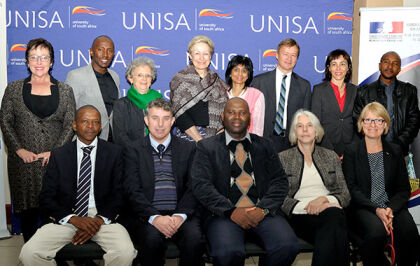 News
News
From Durban COP17 to Paris COP21: water science cooperation for human capital development
From 11 to 12 June 2015, scientists, students and policy-makers gathered in Durban to attend the workshop "From Durban COP17 to Paris COP21: water science cooperation for human capital development" - a side event to the UNESCO conference “Our Common Future under Climate Change".
The event was jointly organized by the Water Research Commission (WRC), the University of KwaZulu-Nata (UKZN), the Institute of Research for Development (IRD), the French Embassy in Pretoria, the Department of Science and Technology (DST), ESASTAP Plus (Strengthening Technology, Research and Innovation Cooperation between Europe and South Africa) and the Alliance Française de Durban.
Potshini Field trip: Research studies on soil carbon dynamics

On Thursday 11 June, over 35 scientists, journalist and departments officials were invited to the to Potshini experimental catchment near Bergville (KwaZulu-Natal Province), where UKZN and IRD are engaged in WRC-funded projects on soil water studies. The catchment monitoring network comprises gauging structures and metrology instruments, most of them automated, for measuring and monitoring hydrological and meteorological processes at various temporal and spatial scales. The participation of the local community and other stakeholders in catchment monitoring was and still is key in ensuring the success of the project activities.
One of the main objectives of setting up such experimental catchment in a small-scale agriculture landscape is to address the challenges of increasing food production, improving rural livelihoods while safeguarding critical ecosystem functions and services. Dr Vincent Chaplot, senior scientist of the project, announced that his team had identified ways to store atmospheric carbon in the soils, mainly through the rehabilitation of the degraded grasslands. “These techniques imply a profound rethinking of the way cattle is allowed to use the land. High intensity but short duration grazing needs to be promoted to yield grassland rehabilitation and carbon allocation to soils for the benefits of ecosystems and humans”.
These recommendations are in line with the carbon sequestration program for agriculture introduced by the French Minister of Agriculture, Stéphane Le Foll, and the Ambassador for Paris Climate 2015, Laurence Tubiana, on 27 April 2015. Entitled “4 per 1000”, this program aims to adapt agricultural practices with the goal of storing carbon more efficiently in the soil. According to this programme, an annual increase of “four per thousand” (0.4%) each year of organic matter in soil would be enough to compensate for the global emissions of greenhouse gases.
Documentary screening « Tana Delta : a wetland in the balance »

Following these vital lessons in land erosion and climate smart agriculture, a scientific event and cocktail was offered at Alliance Française de Durban, around the exhibition «Tana Delta: a wetland in the balance» and the screening of a 25-minute documentary by the filmmaker Khamis Ramadhan, featuring water management issues in the Tana Delta (Kenya). This evening session provided an interesting platform to further interact on Climate Change issues with public and other stakeholders from the South African civil societies. The exhibition was prepared by scientists from the UMR 208 “Heritage “of the IRD and the Kenyan Wetlands Biodiversity Research Team.
The screening was followed by interactions between the audience and Khamis Ramadhan, Dr Stéphanie Duvail – IRD film scientific counsellor, and Dr Jean Albergel, Director of the CNRS/IRD joint office in Southern Africa.
Flagship workshop: water science cooperation for human capital development

On 12 June, over 70 delegates attended a flagship workshop on Water Science Cooperation for Human Capital Development at the University of KwaZulu-Natal (UKZN).
Dhesigen Naidoo, CEO of the Water Research Commission (WRC), presented the South African perspective on Water Resources and Human Capital development, and shared the ‘best management practices’ for water-related WRC research projects.
Dr. Pierre Lemonde, Attaché for Science and Technology of the French Embassy in SA, focused on the French South African scientific cooperation. The value of such cooperation is reflected through a longstanding bilateral agreement between France and South Africa and the presence of French researchers hosted in South African research units. The success of these partnerships is embodied in the area of water research, as French IRD researchers were seconded to UKZN to contribute to ongoing soil water studies, most notably in the jointly-led Potshini project.
The resulting strong scientific grounding of the students, prolific publication records and the investigation of new scientific questions within the context of South Africa, highlight the importance of sharing local and international expertise and promoting international cooperation in advancing science and human capital development in developing countries.
Prominent speakers Prof Thierry Lebel (IRD), Prof Graham Jewitt (UKZN) and Dr Vincent Chaplot (IRD), presented the actual climate challenges and the 2015 United Nations Climate Change Conference (COP21) objectives, as well as the best practices for research and human capacity development.
DST representatives and Mr Stéphane Hogan, EU Science Counsellor to the African Union, provided information on funding opportunities within the H2020 EU framework programmes and EUREKA – a key European driven-market programme.
Synergies and opportunities with other European representatives were explored with the participation of Italian and Dutch scientific delegates.
ludovic.mollier@ird.fr
+27(0)12 844 0118




Comments
You must be logged in to leave a comment. Log in